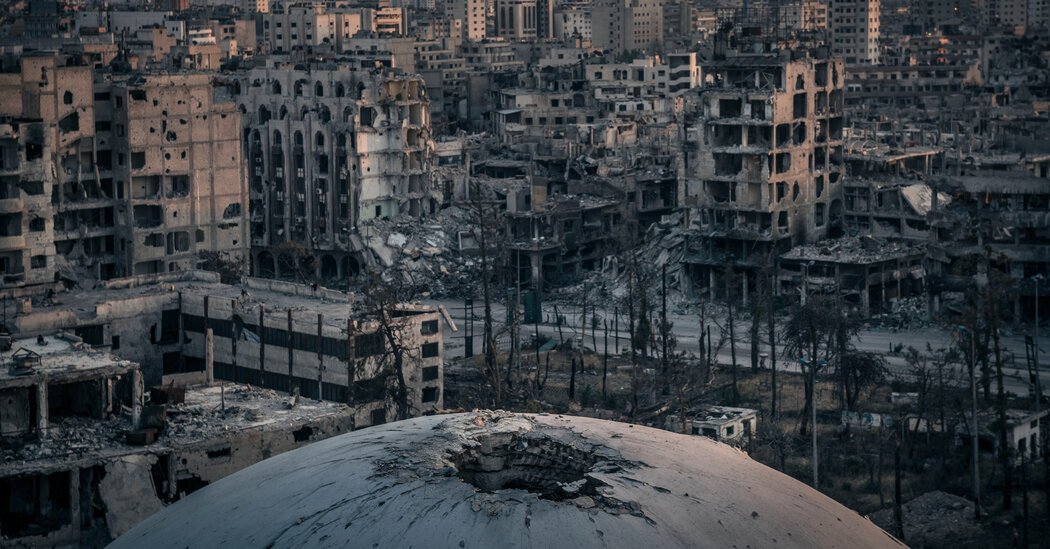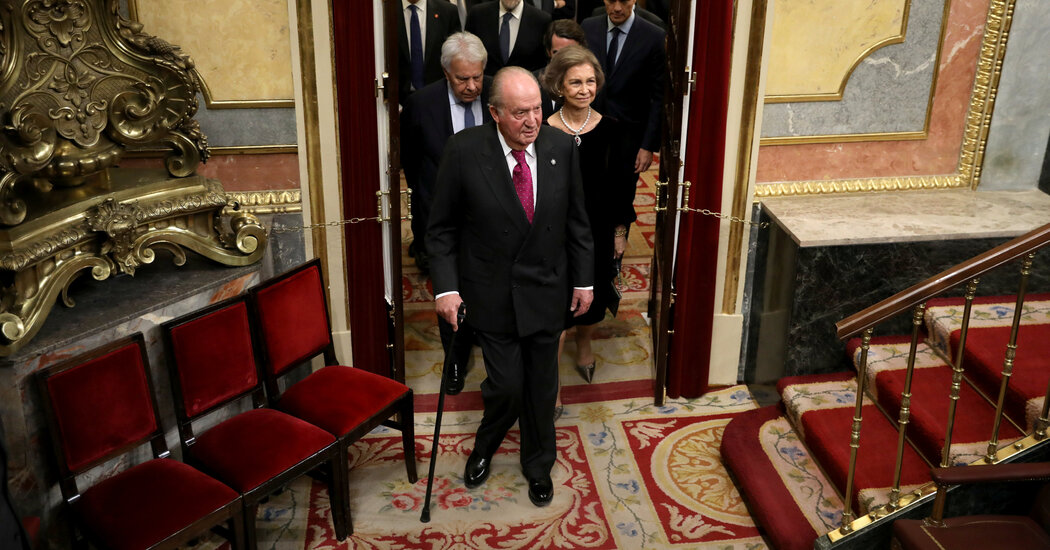
BEIRUT, Lebanon — The Syrian police stormed her house and dragged her husband away. Her eldest son died in a rain of Syrian government shells on her hometown. So like millions of other Syrians, Hanadi Hafisi fled the country with plans to return when the war ended.
A decade later, she’s still a refugee in Turkey, where her work at a center that treats war injuries exposes her to a constant display of the human destruction wrought by President Bashar al-Assad of Syria and his Russian backers: paralysis, missing hands and legs, and deep trauma that leaves her patients asking why such disasters consumed their lives.
“I don’t know what to tell them when they ask me whether they will reach justice,” said Ms. Hafisi, 46. “Seriously, what to tell them? That Bashar will be held accountable? That he will face trial? Of course not.”
As the world takes in the grim realities of Russia’s invasion of Ukraine — the once-vibrant neighborhoods bombed out, the civilians killed by shells while trying to flee, the speculation about whether Russia will use chemical weapons — many Syrians have watched with a horrifying sense of déjà vu and a deep foreboding about what lies ahead.
The Syrian war began 11 years ago this month with an anti-Assad uprising that spiraled into a multisided conflict among the government, armed rebels, jihadists and others. Hundreds of thousands of people have been killed, millions have fled their homes, and Mr. al-Assad has remained in power, in large part because of the extensive support he received from the man now driving the invasion of Ukraine, President Vladimir V. Putin Russia.
The legacy of Syria’s war, and Russia’s role in it, looms large over Ukraine, offering potential lessons to Mr. Putin, analysts said: that “red lines” laid down by the West can be crossed without major consequences; that diplomacy purportedly aimed at stopping violence can be used to distract from it; and that autocrats can do terrible things and face international sanctions — and still stay in power.
Much of the brutality Mr. al-Assad deployed to quash his foes was documented in real time and spurred outrage that left many thinking he could never get away with it.
He dispatched soldiers and armed thugs to stop protests by locking up activists and firing live ammunition into crowds. As the opposition took up arms, his troops shelled, bombed and imposed starvation sieges on towns and neighborhoods that supported the rebels.
Those actions killed large numbers of civilians and sent many more fleeing for their lives. More than half of Syria’s prewar population was displaced during the war, and 5.7 million refugees remain outside the country.
In August 2013, Mr. al-Assad’s forces shocked the world by deploying chemical weapons on rebel-held towns near the capital, Damascus, killing more than 1,400 people, U.S. officials said.
Many Syrian expected that such a blatant violation of international law would prompt Western military intervention, especially since President Barack Obama had called the use of chemical weapons a “red line.”
“I was sure we had witnessed something very few people had experienced before, like those who witnessed Chernobyl or Hiroshima,” recalled Ibrahim Alfawal, 29, who survived the chemical attack and said it had felt like “judgment day.”
But he was shocked when the United States did not intervene. Mr. al-Assad’s forces eventually took control of the towns that had been gassed, seeming to pay no price for his use of forbidden arms.
That seemed to show that Mr. al-Assad could count on impunity, Mr. Alfawal said, and attacks by Syrian forces on civilian infrastructure — including schools, hospitals, neighborhoods and bakeries where families had lined up to buy bread — only escalated.
In 2015, Mr. Putin sent Russian forces to help Mr. al-Assad’s beleaguered army, and soon Russian officers were advising Syrian forces and Russian jets were dropping bombs on Syrian cities — enjoying the same impunity that Mr. al-Assad seemed to have.
In Ukraine, Russia has used disinformation campaigns similar to those it pioneered in Syria, where it falsely branded opposition activists as members of Al Qaeda and accused the rebels of launching the chemical attacks as “false flag” operations to blame the Syrian government.
“They are taking the same concept they used in Syria, to lie and to stick to it,” Mr. Alfawal said of Russia’s approach to Ukraine.
The chemical attacks in Syria continued. In addition to two that killed large numbers of people — in the village of Khan Sheikhoun in 2017 and east of Damascus in 2018 — there have been at least 350 other attacks with chemical substances, according to Tobias Schneider, a researcher at the Global Public Policy Institute in Berlin.
Most of those used chlorine, which is not classified as a chemical weapon but can be used as such to terrify civilians and encourage them to flee.
While no evidence has surfaced that Russian forces used chemical weapons in Syria, researchers believe that Mr. Putin enabled Mr. al-Assad to do so.
“It is absolutely certain that the Russian government at least knows and likely facilitated the use of chemical weapons by the Syrians, mostly chlorine attacks,” Mr. Schneider said.
There are no indications that chemical weapons have been used in Ukraine, but watching the war there, many Syrians see signs that Mr. Putin is employing parts of the Syria playbook.
Russia-Ukraine War: Key Things to Know
The Russians “are willing to devour the green and the dry,” said Radwan Alhomsy, a Syrian activist in southern Turkey, using an Arabic idiom meaning to destroy everything. “They don’t care about the international community or anything else. We saw that in Syria. Burning schools is not new to us. It’s land they want to take, and they will take it.”
European analysts point out the differences between the wars in Syria and Ukraine that could lead to different Western responses. Unlike Mr. Putin, Mr. al-Assad fought to regain control of his own country, not take over one of his neighbors. Unlike Syria, Russia is a nuclear-armed power, complicating the issue of military intervention.
And while the United States and its European allies largely let Mr. al-Assad get away with using chemical weapons in the Middle East, Mr. Putin’s doing so on the European continent would most likely cause greater alarm and elicit a stiffer response.
“If Putin thinks that he’ll be treated like al-Assad, he is wrong because he is not al-Assad and this is not Syria” said Patricia Lewis, director of the international security program at Chatham House.
Still, Mr. Putin could take some solace from Mr. al-Assad’s survival: how the West went on mistakenly believing that Mr. al-Assad’s fall was unavoidable, and how he has clung to power despite sanctions that have strangled his economy and impoverished his people.
Emile Hokayem, a Middle East analyst at the International Institute for Strategic Studies, warned of two strategies used in Syria that the Russians could employ in Ukraine.
One was Russia’s engagement in international diplomacy aimed at ending the violence as a way of distracting the West from the war on the ground. Another was the deliberate creation of a refugee crisis to bog down Europe and sap its resources.
“Creating a humanitarian catastrophe is part of the war strategy, not a secondary effect, because this is how you shift the burden on to the other side,” he said.
Many Syrian refugees are watching the Ukraine war from impoverished camps across the Middle East or from European cities where they are struggling to start new lives.
While some feel bitter about the warmth shown to fleeing Ukrainians, the Syrians also recall their own war, and hope the Ukrainians will fare better than they did.
“We were left alone to face our destiny,” said Mansour Abu al-Kheir, who survived two chemical attacks east of Damascus before fleeing as a refugee to southern Turkey. “I hope this won’t happen to the Ukrainians.”
Cora Engelbrecht contributed reporting from London, and Hwaida Saad and Asmaa al-Omar from Beirut, Lebanon.




